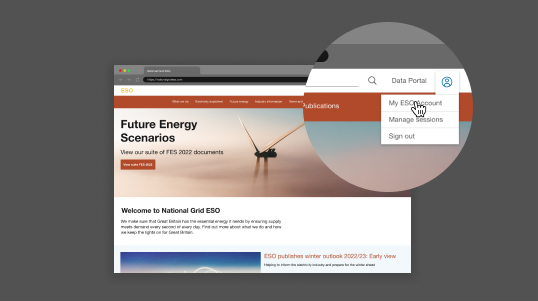
A Day in the Life of a Code Change Senior Manager
25 Jan 2021 - 5 minute read
Our people are at the heart of the ESO, working hard to operate a safe and reliable electricity system, whilst supporting the transition to a greener, and more efficient system for future generations.
Mark Herring gives us an insight into his time at the ESO and tells us what a Code Change Senior Manager does.
What does your current role in codes entail?
I joined the code change team nearly a year ago and found a world of fascinating challenge and complexity.
In the energy industry, “codes” are rules and regulations that every organisation must follow. As the energy landscape changes and decarbonises, we work with industry to understand how these rules and regulations must also change.
We get to tackle some really tricky issues, and work with a broad range of people and organisations. Ultimately, we make recommendations for code changes to Ofgem.
I’m currently working on a set of code changes that will allow more organisations to join markets for increasing or decreasing their supply or usage of energy with short notice. This is really important in enabling more of our energy to come from renewables like wind and solar, as it means that more users can make the most of clean electricity when the wind blows or the sun shines.
This all sounds quite different to my previous roles in innovation and strategy, but in many ways it’s quite similar. Every day I use past experience, looking to the future of the energy system and turning this vision into reality. For example, our Future Energy Scenarios show that more than 60% of all electricity must be renewable by 2025, and that more than half of all cars must be electric by 2035.
The industry rules and codes must change today if we are to enable new technology and ways of using energy.
Aside from understanding the electricity system, I also get to work with stakeholders across the UK and Europe. If rules change then it changes business for stakeholders, and we need to understand how this has different impacts for different stakeholders.
Can you tell us about your background?
In my younger years I was a swimmer which culminated with me competing for New Zealand in the 2008 Beijing Olympic Games.
After years of training for 40-plus hours a week I found myself looking for a new challenge, but all the training meant that there was no time or energy to throw myself into anything else. While competitive swimming was hugely challenging and rewarding, after the Olympics I found myself turning to a new adventure.
What was your career path before joining the ESO?
I started what I call my first “real job” three days after touching back down in New Zealand. That role was in the venture capital industry - we helped small technology companies gain investment and grow globally. It certainly was an adjustment wearing a suit after so long wearing speedos every day!
After a couple of years, I went travelling, and along the way found an opportunity to help build a social enterprise chilli farm in Mozambique which kept me overseas for nearly two years.
I returned to New Zealand and worked in financial consulting, helping to restructure all sorts of companies - from dairy farming to national media organisations. After a few years I then decided to move to the UK where I continued consulting for a while. Then in July 2016, after completing my MBA, I joined the ESO.
My first role was in our innovation team and I found it a great opportunity to apply my skills and experience, helping to match new ideas and tech with the problems that the ESO needed to solve. The only issue was that I knew nothing about the energy industry, so it was a steep learning curve!
I had the opportunity to lead the innovation team for a short period, and then two years ago I was given the chance to set up a new strategy team.
That was super exciting, as it coincided with the UK government’s announcement of the net zero ambitions. We had to totally re-think the pathway of the GB energy system in order to reach net zero in our Future Energy Scenarios, and the implications on industry, consumers, and wider society.
How has the COVID-19 pandemic impacted your work?
Starting a new role in a new team during lockdown has been tougher than I expected. Doing everything over video calls means that you miss out on those in-between moments throughout the day, and I didn’t realise how important off-the-cuff conversations can be until now.
When the rules allowed, I managed to meet my team at a socially distanced meeting. It was the first time that we had seen more than a head and shoulders on a video. I think I’m taller than people expected!
Before this started, I’d only work from home once every couple of weeks.
We’ve learned that we don’t need to be in the same place all the time to work effectively.
That said, there is irreplaceable value from being together – not just to help ideas flow, but also because we get a lot of energy and connection from being around each other as humans.
On the plus it’s been nice working from home, and I love the lack of commute. I get to spend much more time with my family including our 18-month-old son.
